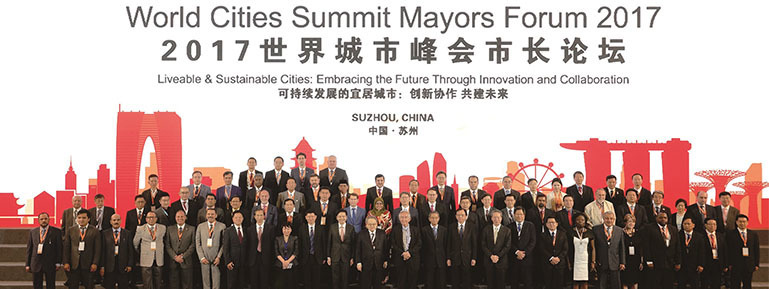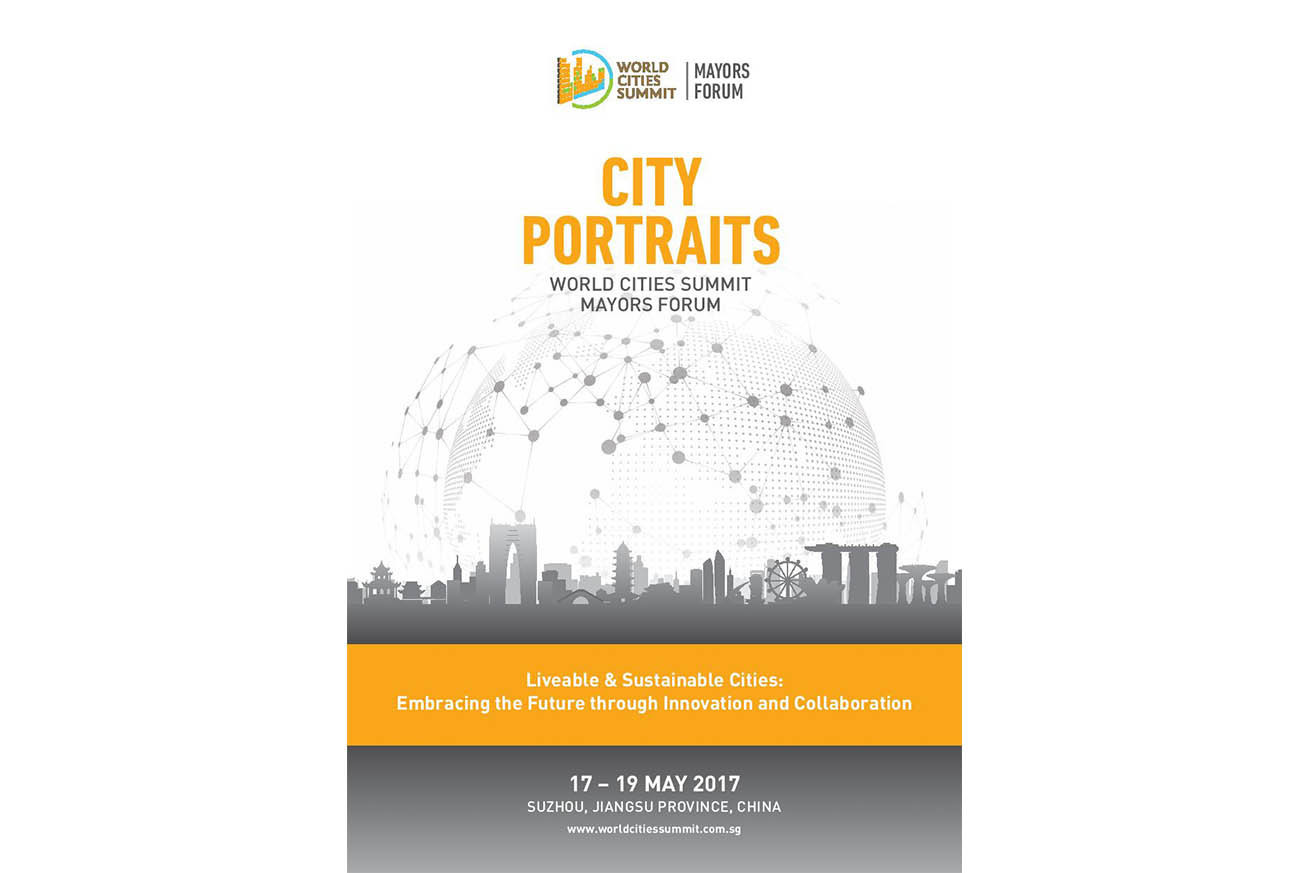World Cities Summit >
About Us >
Past Editions >
Mayors Forum 2017
Mayors Forum 2017

Innovation and collaboration took the spotlight at the 8th World Cities Summit Mayors Forum held in Suzhou City, Jiangsu Province, China, from 17–19 May 2017.
More than 60 mayors and city leaders from 54 cities attending the Forum made a declaration to work towards the shared vision of creating liveable, inclusive, harmonious, resilient, safe and sustainable cities through innovation and collaboration. They noted the need to practise dynamic urban governance and long-term, integrated master planning as key principles to direct the development of cities and implementation of plans.
The Forum explored the possibilities underlying the trade-offs arising from urban planning, preservation of culture, and balancing growth with its impact on cities. In particular, consensus formed around the idea that a stronger sense of culture and identity could give cities more confidence to venture forth and try out new ideas. Modern technology and youth also have a role to play in preserving that which is old and precious while embracing the new. Technology applied well can help rejuvenate heritage and project culture to fresh audiences, while urban millennials can contribute to innovation and collaboration.
HOST CITY
 Suzhou, the 2014 Lee Kuan Yew World City Prize Laureate, has undergone remarkable transformation over the past two decades. The significance of its transformation lies in the city’s success in meeting the multiple challenges of achieving economic growth in order to create jobs and a better standard of living for its people; balancing rapid urban growth with the need to protect its cultural and built heritage; and coping with a large influx of migrant workers while maintaining social stability.
Suzhou, the 2014 Lee Kuan Yew World City Prize Laureate, has undergone remarkable transformation over the past two decades. The significance of its transformation lies in the city’s success in meeting the multiple challenges of achieving economic growth in order to create jobs and a better standard of living for its people; balancing rapid urban growth with the need to protect its cultural and built heritage; and coping with a large influx of migrant workers while maintaining social stability.
Suzhou had initially benefitted from Singapore’s experience and contributions in the 1990s, when it set up its first industrial estate and prepared a master plan of the industrial township and city centre. Since then, Suzhou has undertaken several independent initiatives that have propelled the city forward while maintaining its specific and distinctive local identity and culture, creating a high quality of life for its residents and workers and attracting tourists to share in its past and future.
YOUNG LEADERS SYMPOSIUM

Young leaders from public and private sectors related to urban development and governance focused on the increasingly vital role of culture and heritage in building liveable and sustainable cities. Cities need to find a good balance between preserving and integrating the best from the past, while fostering a viable and meaningful future for all.
The Symposium recognised:
- Culture’s role in spurring economic rejuvenation and growth by promoting new economic activities to nurture culture-related enterprises and create jobs.
- The need to build trust in the authorities to help pave the way for city planning in a way that balances culture with development.
- Applying technology to aspects of culture can enhance the living environment.
- The need to find ways to manage the tussle between culture and internationalisation.
SESSIONS
Advancements and Challenges of Cities: Planning and Governance
- Capacity for city leadership must be developed and honed at all levels, from the mayor to neighbourhood communities, and across all jurisdictions.
- City planning must balance many mechanisms, including institutional frameworks for participatory decision-making and budgeting, and public-private partnerships.
- An international network like a “league of cities” would enable cities to share more insights on planning and governance and develop opportunities for collaboration.
Curating the City: Heritage and Culture
- Heritage and culture are crucial to the development of all cities as many quantitative and qualitative benefits can be derived from them.
- Promoting culture can help mitigate the risk of urban youth feeling disconnected from their heritage.
- Cultural capital builds on trust and social capital, which can also be nurtured by promoting activities such as volunteerism and philanthropy.
The Tenacity of a City: A Resilient and Sustainable Environment
- Involve community stakeholders in getting to know the people’s needs before finding the resources for city plans to meet them.
- Earning the trust of the people is essential for city plans to work.
- Heritage and culture should be protected before planning new areas.
Engines of Growth: Balancing Liveability with Growth
- A city’s growth strategy should “cherish the crown jewels” that have made it strong in the past.
- While allocating space for amenities and activities to enhance liveability, cities must also create room for growth by investing in land uses such as innovation clusters.
- Growing cities need talent and must seek to retain their millennial digital-native residents by ensuring they can afford to live there.
